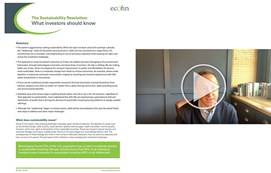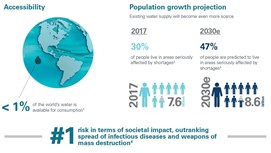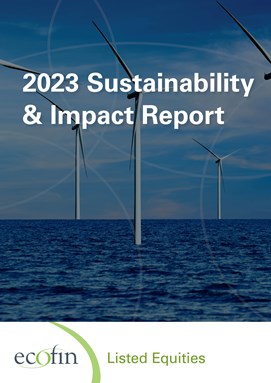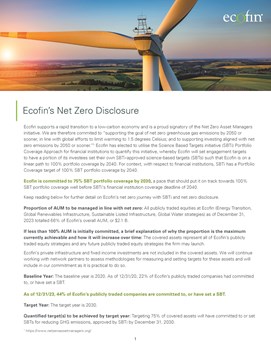Ecofin Global Renewables Infrastructure UCITS Fund
Dated 1 December 2022
Sustainability Risks
Sustainability risk is defined as “an environmental, social or governance event or condition that, if it occurs, could cause an actual or potential material negative impact on the value of the investment”.
It is concerned with the risk that the value of an investment could be materially negatively impacted as a result of environmental or social risks. It is also worth noting that such risks need only be considered where they could have a material negative effect on the value of the relevant investment.
Ecofin Advisors Limited is the Sub-Investment Manager. Research on environmental, social and governance (“ESG”) matters is undertaken by the Sub-Investment Manager’s investment team. The team believes that engagement on environmental and social issues is much more powerful when it comes from the person committing the money to the investment, rather than from a separate sustainability team.
Sustainability risk analysis is also a part of stock assessment to identify negative ESG risks, or potential risks, of investments to ascertain the nature of the sustainability risk, as well as its materiality. The primary aim of this process is to assess how each ESG risk can derail or materially impact the underlying investment case of a company. The Sub-Investment Manager integrates sustainability risk into its investment decision making process both at the initial due diligence stage and as part of its ongoing due diligence.
The consistent approach to research laid out above and the well-defined investment universe generally allows the Sub-Investment Manager to plan and drive research, rather than react to ESG events.
The results of its assessment of the likely impact of such integration of sustainability risks on the returns of the Fund:
At the core of the Sub-Investment Manager’s stock selection process is the understanding and mitigation of ESG risks in an effort to provide better risk-adjusted returns to investors. It is also becoming more evident through formal academic studies that better ESG profiles often deliver better absolute performance, thus underscoring the importance of ESG from both a risk management and value creation perspective.
For narrative on the identification and integration of sustainability risks in the portfolio of the Fund please refer to Annex I and Annex II of this Supplement.
Annex I
The disclosures in this section are made pursuant to Article 9 of the SFDR.
Information on how the environmental, social and governance characteristics of the Fund are met:
The Sub-Investment Manager of the Fund believes that societies need to accelerate the transformation to a greener, decarbonized and more sustainable economy. Due to this belief, the Fund is primarily focused on investing in companies that are positioned to benefit from the pursuit of addressing climate change, reducing pollution and resource scarcity, managing waste, and promoting efficiency.
The Sub-Investment Manager believes the investments generate a more sustainable future as described by the United Nations Sustainable Development Goals 7, 9, 11, 12, & 13, which, among other things, call for climate action, responsible consumption and production, sustainable communities, and affordable and clean energy for all. According to the UN, a sustainable future is defined as development that meets the needs of the present without compromising the ability of future generations to meet their own needs.
ESG research is thoroughly incorporated into the investment process for the Fund. Each company has an assigned analyst who is responsible for all aspects of the research process and for engaging with company management. The Sub-Investment Manager primarily utilizes company filings and engagement with management teams in its ESG assessment for qualitative analysis. The Sub-Investment Manager has access to specialist research from third-party providers which can serve to augment and support its in-house research.
The Sub-Investment Manager believes that well-managed companies actively managing their ESG risks are more capable of generating superior long-term performance. A thorough understanding of ESG issues empowers companies to potentially mitigate risks and take advantage of the opportunities resulting from these issues. The Sub-Investment Manager’s research process integrates both traditional fundamental analysis with ESG factors. The Sub-Investment Manager believes these analyses may impact and reflect into a company’s overall shareholder returns. Each company has an assigned analyst who is responsible for all aspects of the research process and for engaging with company management, including ESG-related issues, in populating the risk-based model to seek to provide better risk-adjusted returns
The Sub-Investment Manager’s perspective or edge in addressing renewal infrastructure is derived from its significant expertise in dealing with and evaluating policy frameworks within some of the major greenhouse gas (GHG) emitting industries, in particular utilities and sustainable infrastructure.
The principal area of market inefficiency the Sub-Investment Manager is looking to exploit relates to its proprietary views on how policy frameworks (and laws) around ESG matters, such as climate change and emission efficiency, together with technology innovations, can conspire to create substantial deviations in market expectations.










